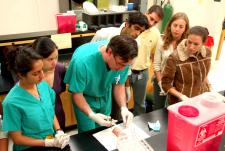Teaching medical students to challenge ‘unscientific’ racial categories
By Ike Swetlitz,
STAT
| 03. 10. 2016
Untitled Document
Medical students looking to score high on their board exams sometimes get a bit of uncomfortable advice: Embrace racial stereotypes.
“You see ‘African American,’ automatically just circle ‘sickle cell,’” said Nermine Abdelwahab, a first-year student at the University of Minnesota Medical School, recounting tips she’s heard from older classmates describing the “sad reality” of the tests.
Medical school curricula traditionally leave little room for nuanced discussions about the impact of race and racism on health, physicians and sociologists say. Instead, students learn to see race as a diagnostic shortcut, as lectures, textbooks, and scientific journal articles divide patients by racial categories, reinforcing the idea that race is biological. That mind-set can lead to misdiagnoses, such as treating sickle cell anemia as a largely “black” disease.
Read more...
Image via Wikimedia.
Related Articles
By Fyodor Urnov, The CRIPSR Journal | 10.18.2024
The field of clinical gene editing has a bona fide crisis on its hands—a crisis that has to, and can be, promptly resolved.
An outside observer of our field might be surprised by this and say—what crisis? The first...
By Walt Bogdanich and Carson Kessler, The New York Times | 10.23.2024
By 2021, nearly 2,000 volunteers had answered the call to test an experimental Alzheimer’s drug known as BAN2401. For the drugmaker Eisai, the trial was a shot at a windfall — potentially billions of dollars — for defanging a disease...
By Ashleigh Wyss [cites CGS' Katie Hasson], Listnr | 10.09.2024
Discovering your genetic history can be as simple as spitting into a test tube, but what happens when your data ends up in the wrong hands?
With at-home DNA test kits becoming increasingly popular throughout the 2010s, curious consumers have...
By Kevin Davies , Genetic Engineering and Biotechnology News | 10.22.2024




